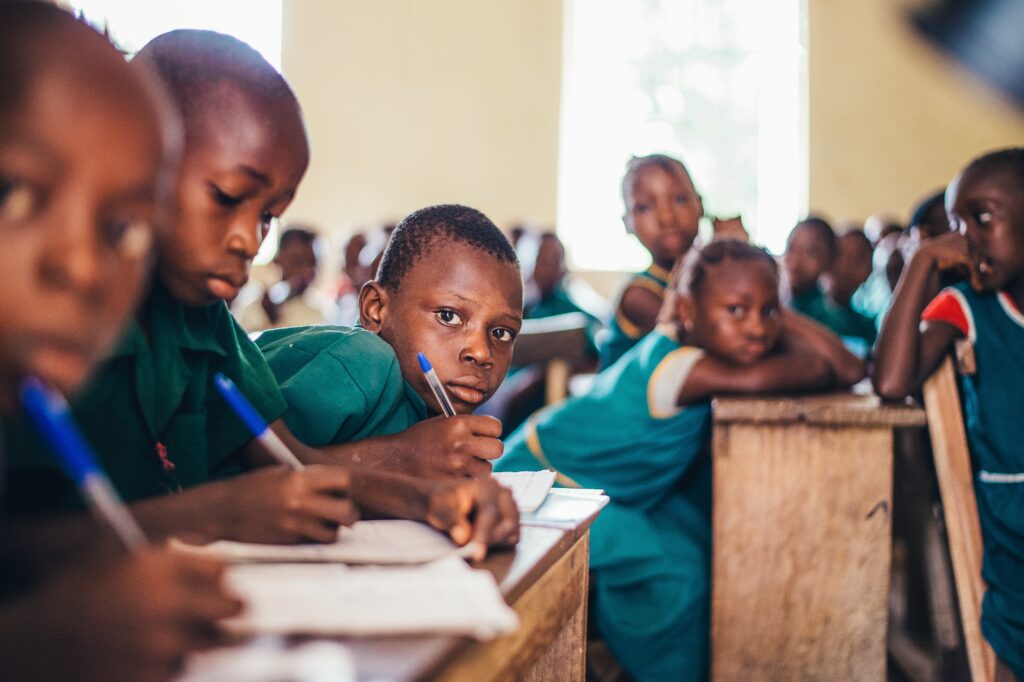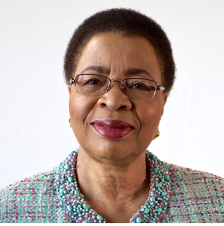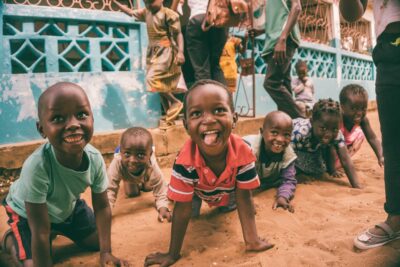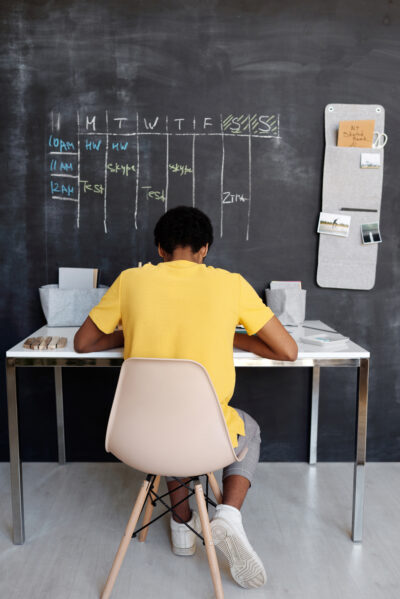“Girls are not going to school; they are just sitting at home. Some are coming of age. Parents are facing an uncertain future due to loss of income caused by the coronavirus, so they are having the girls cut[go through female genital mutilation] and will marry them off,” said Domtila Chesang in an anti-FGM campaigner in an interview by Global Citizen, March 2020.

Photo Credit: Annie Spratt
[Tasha shares] “My chores have increased of course because schools have closed.” She said that she sometimes missed distance learning classes on television because of her chores at home. Zawadi N., 16, in Nairobi, said she spends almost five hours a day looking after her younger siblings: “There’s much more to do with siblings because I am also acting as a teacher to the younger ones.” Human Rights Watch, August 2020.
This pandemic has ruined my life,” says 15-year-old Sarah*. “While before the pandemic I had lunch at school and another meal at home, I now often don’t eat for the whole day,” She explains. Sarah says she was raped by a boy who offered her food in exchange for sex after her school was closed and her parents could not afford to feed her- except story carried by Aljazeera, September 2020.
These accounts make up part of the reality of over 11 million girls – from pre-primary to tertiary education – at risk of not returning to school in 2020 according to UNESCO estimates due to the Covid-19 pandemic. The impact of the pandemic on education was the focus of Mrs Graça Machel’s closed meeting presentation at this year’s 75th session of the UN General Assembly (UNGA 75) that officially launched on Tuesday, 15 September 2020.
Mrs Graça Machel was speaking in her capacity as one of the SDG Advocates for the 17 Sustainable Development Goals. She was appointedwith other advocates including entrepreneur Jack Ma and Ghana’s President Nana Akufo-Addo by UN Secretary-General Antonio Guterres to mobilize the world to reach for the global goals.
Speaking on statics by UNICEF, she pointed out that at least 463 million (31%) – of schoolchildren worldwide cannot be reached by digital and broadcast remote learning programs enacted to counter school closures.Sub-Saharan Africa has the highest rate of students not being reached by digital and broadcast remote learning policies: at least 48% in West and Central Africa and 49% in Eastern and Southern Africa.

GMT Founder-Mrs Graça Machel
That said, she also acknowledged that significant strides had been made by different governments, citing these examples:
African Best Practice Responses to Education amid COVID[i]
In Côte d’Ivoire, the Ministry of Education, Technical and Professional Training through the initiative named “École fermée, mais cahiers ouverts!” (Closed school but open notebooks) and in partnership with Eneza Education was able to allow reviewing all elementary school lessons for free by mobile phone. Education classes are also available on national TVs as well as on some radio stations.
In Senegal, the Ministry of Education provided the Online Resource Platform; the main tool to make teaching and learning resources available online.
In Kenya, the Ministry of Education has initiated several methods for children to learn online and through EDU-channel or Elimu channel. The Kenya Institute for Curriculum Development has issued KICD Broadcast to Schools Timetable on Radio Taifa as well as Kenya Education Cloud that has diverse digital content based on a variety of learning areas presented through interactive pdf, e-pubs, audio and visual. Lastly, learners at home can tune into KBC English Service radio to listen to interactive radio programs.
In South Africa, the Department of Basic Education made available online resources to support learning at home during the lockdown. It has study materials, multimedia and reading materials.
African Innovative Responses to aid Virtual Learning[ii]
Worldreader’sBookSmart for home solution allows parents and caregivers to access a library from their mobile phones so they can support their children’s learning while physical schools are out of session. The books can be easily downloaded for offline reading.
African Storybook remains a good reading partner by offering open access to picture storybooks in selected national languages. Free apps for reading and making storybook are also available.
The Vula Bula series – developed by the Molteno Institute – is the first graded reading program in languages spoken in Southern Africa where progression from level to level is based on the phonics of each language.

Photo by Gabriele Mango from Pexels
Mrs Machel noted that access to quality and safe education is at continued risk. Moving forward a comprehensive plan is needed to bring back the millions of children who are out of school and ensure continued learning for the millions who are likely not to come back. She shared a few recommendations on how best to tackle the current education dilemma.
Recommendations for Improved Access to Quality Education
- Safety #1 Priority – Ensure that measures related to social distancing, quarantines, and partial or full lockdowns are child-friendly, cognisant of the capacity and vulnerability of children.
- Alternative modalities/platforms for education for children who might remain out of school – Explore learning through play options; upskilling of at-home caregivers; outreach from CSOs and community-based organizations to provide psychosocial support and mental health – Focus to make sure that all children develop foundational levels in literacy, numeracy and socio-emotional skills while at home.
- Investment in Teacher preparedness – Training of teachers to meet the challenges of the digital revolution and online learning.
- Increased Nutrition/Hunger Interventions – Maintaining school feeding programmes essential- even while students are out of school. (e-)vouchers to help families whose children normally benefit from free or discounted meals at school, while schools are closed.
- Girls Education Needs at Center of Education Response – Use as an opportunity to improve retention rates and access to quality education for girls’; enhance adolescent life skills as part of curriculum redesign. Mainstreaming of STEM (particularly for girls). Increase interventions to combat early pregnancy and child marriage.
- Improving ICT infrastructure – Government/private sector increased investment in ICT infrastructure and improving power and digital connectivity, providing equipment (computers, tablets, mobile phones, etc.) and using local media (radio, television, Internet, etc.), all of which should be supplemented with printed materials and other educational aids to both rural and urban communities alike.

Photo by Julia M Cameron from Pexels
- Rapidly mobilize additional financing for education(Education Commission recommendations).
- Every country should pledge to protect education spending, prioritising the needs of the most disadvantaged children through where possible, conditional and unconditional cash transfers to promote school participation.
- The international community must increase aid for education, focusing on the most vulnerable, including the poor, girls, children in conflict situations and the disabled. The quickest way to free up resources for education is through debt relief. The 76 poorest countries have to pay $86 billion in debt-service costs over the next two years. We call for debt suspension with a requirement that the money for debt servicing be reallocated to education and other priority investments for children.
- The IMF should issue $1.2 trillion in Special Drawing Rights (its global reserve asset) and its membership should agree to channel these resources toward the countries that need them most, creating a platform for recovery. (Education Commission recommendation).
- Increased emergency and recovery support for CSOs and grassroots organizations providing educational support, child care services, and supplemental learning activities at the grassroots level.
- Share learnings – Best practices need to be disseminated beyond national and regional borders. UN can play a role in information dissemination and promote cross-pollination of best practices.
Sources:
[i] https://www.globalpartnership.org/blog/africa-supports-reading-and-learning-during-covid-19-pandemic
[ii]https://www.globalpartnership.org/blog/africa-supports-reading-and-learning-during-covid-19-pandemic










 The Trust supports and mobilises civil society networks on issues of ending child marriage, ending violence against children, ending female genital mutilation and promoting children’s rights, to carry out advocacy and action across Africa. Special focus is placed on Malawi, Mozambique, Tanzania and Zambia where child marriage continues to be a problem largely driven by poverty, gender inequality, harmful traditional practices, conflict, low levels of literacy, limited opportunities for girls and weak or non-existent protective and preventive legal frameworks.
The Trust supports and mobilises civil society networks on issues of ending child marriage, ending violence against children, ending female genital mutilation and promoting children’s rights, to carry out advocacy and action across Africa. Special focus is placed on Malawi, Mozambique, Tanzania and Zambia where child marriage continues to be a problem largely driven by poverty, gender inequality, harmful traditional practices, conflict, low levels of literacy, limited opportunities for girls and weak or non-existent protective and preventive legal frameworks.




 Education is a fundamental right for all children, which is also a vehicle for social, economic and political transformation in communities, countries and the African continent at large. Recent studies indicate a lack of progress in some of the critical commitments aimed at improving education quality, access, retention and achievement, particularly for girls. In most African countries, girls may face barriers to learning, especially when they reach post-primary levels of education. By implementing multi-dimensional approaches to education which includes core education, personal development, life skills and economic competencies, the Trust partners with funding partners, governments, civil societies and the private sector to improve education access.
Education is a fundamental right for all children, which is also a vehicle for social, economic and political transformation in communities, countries and the African continent at large. Recent studies indicate a lack of progress in some of the critical commitments aimed at improving education quality, access, retention and achievement, particularly for girls. In most African countries, girls may face barriers to learning, especially when they reach post-primary levels of education. By implementing multi-dimensional approaches to education which includes core education, personal development, life skills and economic competencies, the Trust partners with funding partners, governments, civil societies and the private sector to improve education access.

 The Nutrition and Reproductive, Maternal, New-born, Child and Adolescent Health and Nutrition, (RMNCAH+N) of the Children’s Rights and Development Programme aims at promoting the Global Strategy for women, children and adolescents’ health within the Sustainable Development Goals (SDG) agenda. The strategy emphasises on the importance of effective country leadership as a common factor across countries making progress in improving the health of women, children and adolescents.
The Nutrition and Reproductive, Maternal, New-born, Child and Adolescent Health and Nutrition, (RMNCAH+N) of the Children’s Rights and Development Programme aims at promoting the Global Strategy for women, children and adolescents’ health within the Sustainable Development Goals (SDG) agenda. The strategy emphasises on the importance of effective country leadership as a common factor across countries making progress in improving the health of women, children and adolescents. Through its Early Childhood Development (ECD) plan, The Trust will seek to put into action the new science and evidence Report that was presented by Lancet Series on Good and early development – the right of every child. This will be achieved by mobilising like-minded partners to contribute in the new science and evidence to reach all young children with ECD. The Trust’s goal is to be a catalyst for doing things differently, in particular, to rid fragmentation and lack of coordination across ECD sectors. In response to evidence showing the importance of political will in turning the tide against the current poor access and quality of ECD. Even before conception, starting with a mother’s health and social economic conditions, the early years of a child’s life form a fundamental foundation that determines whether a child will survive and thrive optimally.
Through its Early Childhood Development (ECD) plan, The Trust will seek to put into action the new science and evidence Report that was presented by Lancet Series on Good and early development – the right of every child. This will be achieved by mobilising like-minded partners to contribute in the new science and evidence to reach all young children with ECD. The Trust’s goal is to be a catalyst for doing things differently, in particular, to rid fragmentation and lack of coordination across ECD sectors. In response to evidence showing the importance of political will in turning the tide against the current poor access and quality of ECD. Even before conception, starting with a mother’s health and social economic conditions, the early years of a child’s life form a fundamental foundation that determines whether a child will survive and thrive optimally.